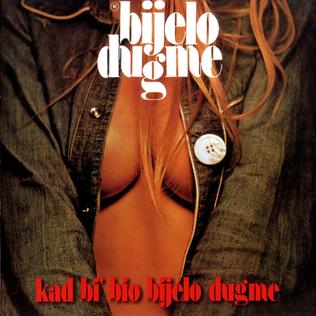
Severina Vučković, better known mononymously as Severina, is a Croatian singer-songwriter and actress. In 2006, the Croatian weekly Nacional listed her among the 100 most influential Croats, calling her "the only bona fide Croatian celebrity".

Šaban Šaulić was a Serbian and former Yugoslavian folk singer. Renowned for his refined baritone vocals and performances characterised by emotional intensity and crowd interaction, his career spanning over five decades has enjoyed both critical and commercial success. He is referred to as the "King of Folk Music".
Tonči Huljić is a Croatian musician, songwriter and music producer. He is best known as the founding member, songwriter and producer of one the most famous Croatian pop bands, Magazin.

Kemal Monteno was a Bosnian recording artist and singer-songwriter whose career stretched from the 1960s to the 2010s. He is widely considered one of the greatest songwriters of the former Yugoslavia.

Šta bi dao da si na mom mjestu is the second studio album from influential Yugoslav rock band Bijelo Dugme, released in 1975.

Bitanga i princeza is the fourth studio album by Yugoslav rock band Bijelo Dugme, released in 1979.
Sateliti is a Bosnian root music group, formed in 1989. Today, they are the most popular root music group in Bosnia. The original singer and founder of the group, Muto, is still with the group and is the main vocalist.
Sinan Sakić was a Serbian pop-folk singer.
Melodije Mostara is a music festival held annually in Mostar, Bosnia and Herzegovina. The festival was first held in 1995 and has been held annually since then. It has become one of the premier music festivals in the region.

Pljuni i zapjevaj moja Jugoslavijo is the eighth studio album by Yugoslav rock band Bijelo Dugme, released in 1986.

Kad bi' bio bijelo dugme is the 1974 debut studio album from influential Yugoslav rock band Bijelo Dugme.

Gladijatori u BG Areni is a double and the fifth live album by Serbian and former Yugoslav rock band Riblja Čorba. The album was recorded on Riblja Čorba concert held in Belgrade Arena, on March 10, 2007.

Kad bi moja bila is the ninth studio album by Zdravko Čolić, released in 1997. It was Čolić's first album after seven years of voluntary absence from the scene, mainly because of the ongoing wars in ex-Yugoslavia.
YU retROCKspektiva is a compilation album series released by Serbian record label Komuna in 1994. The discs, compiled by Serbian music critics Bogoljub Mijatović and Peca Popović, feature songs by artists from the former Yugoslav rock scene.

Zumreta Midžić, known by her stage name Zuzi Zu, is a popular Bosnian singer, musician and songwriter. She performs various music genres from pop-rock to Bosnian folk - sevdalinka and Gypsy music. She was born in Velika Kladuša, Bosnia and Herzegovina and for many years she was living and working in Sarajevo.

Ružica Sokić was a Serbian actress and writer.

Slobodan "Boba" Stefanović was a Serbian and Yugoslav singer and songwriter. He was one of the leading stars of the Yugoslav pop scene in the 1970s.
Dalibor Brun is a Croatian recording artist who rose to prominence with his work in Yugoslav music acts Uragani and Korni Grupa, but also maintained a successful solo career since 1969.

Maja Šuput is a Croatian singer, actress, television host, and model.

Oprosti Mala is the debut studio album by Croatian pop singer Jelena Rozga. The album was released through the record label Croatia Records in 2006. It included songs written and arranged by several musicians and songwriters, among which Tonči Huljić, Đorđe Novković, Vjekoslava Huljić, Željko Pavičić and Remi Kazinoti, the last of whom is also the main producer of the album.
This page is based on this
Wikipedia article Text is available under the
CC BY-SA 4.0 license; additional terms may apply.
Images, videos and audio are available under their respective licenses.














